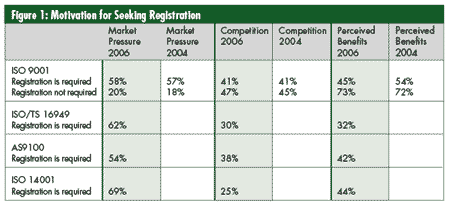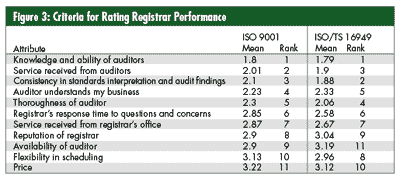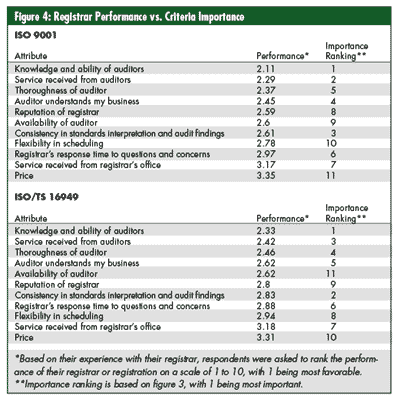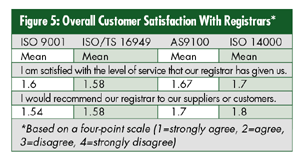| by Dirk Dusharme
Nearsightedness is an unfortunate side effect of performing roughly the same surveys year in and year out. The tendency is to compare this year's survey to last year's, try to detect trends, look at shifts and so forth. This approach often misses the overall import of the data you're so vigorously massaging. Thus, it's always a pleasant surprise when you see that data come to life in a real-world context. Such is the case with this year's standards survey.
While compiling the data, we were also editing Craig Cochran's article, "Registrar Search Simplified," which appears on page 42 of this issue. We're pleased to note that our survey results reinforce Cochran's piece. His suggestions on how to select a registrar are amply supported by what survey respondents say is important to them in a registrar and in registration.
Based on past interviews with ISO standards coordinators and managers at registered companies, and also on suggestions from registrars, we developed several questions to gauge the importance of certain elements of registration as well as the degree of customer satisfaction with registrars.
This article will attempt to not only present survey results but discuss how these results tie into Cochran's observations on how to select a registrar.
Results are based on an online survey sent to North American companies.
By and large, companies pursue registration to a quality management system standard because they have to, not because of the perceived benefits of doing so. For instance, this year, as with our 2004 survey, about 72 percent of respondents whose companies are registered to ISO 9001 said that registration was a customer requirement. (See figure 2.)


With that in mind, if we then look at a company's motivation for registration, broken down by whether registration was required or not, we find a couple of interesting points, as seen in figure 1. With ISO 9001, nearly 73 percent of companies for which registration is not required report that the benefits of registration were a motivation for becoming registered. That's not too surprising. What is surprising is that about half (45%) of companies for which registration is required also report that the perceived benefits of registration were a motivation. This number is down a bit from the 2004 survey but is still quite respectable.
This doesn't hold true for companies registered to ISO/TS 16949, which is customer-mandated for 98 percent of our respondents. In this case, only 32 percent of respondents report that the benefits of registration were a motivating factor. For the 97 percent of AS9100-registered companies where registration was a requirement, 42 percent say benefits were a motivation.
Although there are those who disagree with the importance of accreditation, almost all registrars are accredited by an accrediting agency. In the United States this would be the ANSI-ASQ National Accreditation Board (ANAB).
Of the respondents who received their certificate from an accredited registrar, almost half (49%) said that they placed "great value" on that accreditation. Of those that had an opinion on the topic, 58 percent said that they wouldn't keep their certification if it wasn't accredited. Of that group, 7 percent said that they would actually leave their current registrar if it lost its accreditation.
Whether or not accreditation is important to you, it may be important to your customers (some require that your certificate come from an accredited registrar). As Cochran points out, you should ask your potential registrar if they're accredited.
We asked each respondent to rate the importance of various criterion on their registration experience and then asked them to rate how well their registrar performed on each.
Figure 3 shows how respondents ranked the importance of the various criteria. Notice that the top five most important criteria are related to the respondent's experience with the auditor, which is why Cochran puts a lot of emphasis on being able to interview your prospective auditor before signing on with a registrar.


In both this year's and 2004's survey, respondents reported that of the entire registration experience, the most important criteria are the knowledge and ability of auditors, service received from auditors, consistency in standards interpretation and audit findings, auditor understanding of the client's business and auditor thoroughness. With the possible exception of standards interpretation, which is a combination of both the registrar's and the auditor's understanding of the standard, these five criteria all center on a client's experience with the auditor.
Be sure that your registrar allows you to interview your auditor so that you can ensure that he or she understands your business. To the list of questions that Cochran suggests, we suggest adding several that will demonstrate the auditors' understanding of your business or industry.
The next highest-ranked criteria are the registrar's response time to questions and concerns, and service received from the registrar's office. In short, if something isn't going right with the audit or there are questions, respondents want the registrar to be immediately available.
It's easy to see that the criteria fall into two categories: the audit experience, which are the top seven criteria; and the criteria you consider either in choosing a registrar or preparing for the audit. The audit is where the rubber meets the road and, as we will see, where registrars seem to concentrate their customer-satisfaction tactics.
For the past two years, registrars have consistently scored well on the five criteria that respondents say are important, with one exception: consistency in standards interpretation and audit findings. Even though this item is third in terms of importance to respondents, it ranks seventh in registrar performance for ISO 9001.
There are, perhaps, a couple of reasons for this. First, most registrars use contract auditors. These auditors may come from different industries and may have worked for different registrars, and thus have different interpretations of standards.
"I think it comes down to auditor training," says Gary Minks, TÜV America's certification body director. "When it comes to contract auditors it's important to do continual training. TÜV conducts training and discusses interpretations with all of its auditors and tries to harmonize them so that we give consistent interpretations to our clients. It's something all registrars have to stay on top of."
Minks also points out that it's important for registrars to train auditors who come from industries that may apply the standard in different ways.
The standard itself may also be the genesis for inconsistent interpretations. One of the overall changes from ISO 9001:1994 to ISO 9001:2000 is that the latter is less prescriptive, says Mark Lutz, an ISO 9001 consultant and lead auditor, who has witnessed more issues in interpretation since the transition to the 2000 version.
"The issue is that there has to be more interpretation from the auditor," explains Lutz. "It's kind of a trade-off. The standard had to be written generally, which is a good thing, but it puts more burden on the auditor. It definitely requires more thinking."
As an example, Lutz points to the section of the standard dealing with preservation of material. This section used to take up half a page in the standard and is now three sentences. In Lutz's opinion, making the standard more general has been good for broadening its applicability but has led to more variation in interpretation.
Along with standards interpretation, registrar response time to questions and registrar service also ranked fairly low in performance.
What all this seems to imply is that although the registrars are doing a terrific job in hiring, training and deploying auditors that know the client's business and can deliver good audits, the registrars themselves have some weak points at the home office. That's where more effort could be expended.
Cochran discusses price in his article, and certainly you want to have a good idea of what registration is going to cost you. It is, however, a criterion that seems to have little importance… maybe.
Respondents tell us that price ranks only eleventh in importance when dealing with a registrar, behind a registrar's reputation, auditor availability and flexible scheduling. And yet, when asked what would cause them to change registrars, 25 percent gave price as a reason.
Without digging further it's hard to say what this means. Our guess is that respondents are telling us that price isn't necessarily an important reason for selecting a registrar, but all else being equal, it might be the determining factor. In relation to Cochran's article, this might mean that you first narrow your selection to the registrars that meet all criteria except for price. Price then becomes a bargaining point.
As discussed earlier, we asked the open-ended question, "What would cause you to transfer to another registrar?" Price was the number-one answer (25%), followed by poor service (15%), lack of auditor knowledge (8%), poor standards interpretation (7%), lack of auditor/registrar understanding of the business (7%) and a variety of others, mostly related to the auditor.
As we say each year, as a whole, customer-satisfaction ratings for registrars are high. It's a highly competitive business, and the only way to stay afloat is to provide outstanding service. As seen in figure 5,registrars are keeping their customers happy.

When asked to respond to the statement, "I am satisfied with the level of service our registrar has given us," 45 percent strongly agreed and 48 percent agreed. Only 6 percent disagreed or strongly disagreed.
When asked to respond to the statement, "I would recommend our registrar to our suppliers or customers," 47 percent strongly agreed and 44 percent agreed. Again, only 6 percent disagreed or strongly disagreed.
ISO 9001 will probably remain a necessary evil for many companies, something that you do because your customers require it or because your competition is doing it. But as those who have pursued the standard for the benefits that can be derived from a quality management system can attest, there's more to be gained than just a certificate. However, the value gained from registration is tied up in the registration process itself, which in turn derives its value largely from the client-auditor relationship.
This survey and past surveys have shown that respondents are most pleased with their registration when the auditor is knowledgeable and professional. With that in mind, when considering registration or a new registrar, be prepared to ask questions related to the registrar's and, more important, the auditor's qualifications. Reading Cochran's "Registrar Search Simplified" is a good place to start.
Dirk Dusharme is Quality Digest's editor in chief.
|